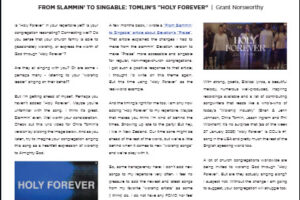Take this link to read Grant’s article as featured in the March issue of Worship…

BASS GUITAR: HIGHER JOY THROUGH SOLID SIMPLICITY
By Grant Norsworthy
One of the most wonderful things about the electric bass guitar is that – relative to other instruments like, drums, acoustic or electric guitar and keyboard – it’s quite simple to be good enough to be useful. You don’t have to spend long with a bass guitar before you’re ready to be in the band.
Sure, it takes as much practice, perseverance and talent as any other instrument to acquire outstanding ability, but that higher level is not necessary to fill the bass needs for a lot of music – especially today’s most popular Church music.
Heck! When I was 19, the same week I started just claiming that I was a bass player to my musical friends, I was asked to join three bands. I had very little idea of what I was doing and I didn’t even own a bass yet!
It’s true that a lot of bass players in church bands have limited technical ability. Especially in the (mainly) volunteer/amateur bands of smaller and medium-sized churches, the bassist is often someone who’s jumped (or been thrown) into the position with very little background on the instrument. A warm body who’s willing to have this lump of wood hanging over their shoulder and shows up!
The band leader’s wife or girlfriend has been asked to play bass on more than one occasion. Someone who played cello in high school might find themselves as a Church bassist. A team with three guitarists might ask two of them to sub out and share the bass playing role. In many cases, they do a wonderful job – bringing just what is needed. In some ways their lack of expertise can actually be an advantage.
Want a good laugh? Here’s a very funny (yet slightly inappropriate) video about adding a bassist to a Christian band. Don’t watch it, if you’re offended by coarse language.
And please note: A 6-string guitarist who gets asked to play bass is NOT a failed guitarist. In my opinion, guitar to bass is actually a promotion.
For a lot of today’s Church music, the “bass-level” (pun intended) technical requirements are quite low. Thankfully, the base (bass?) can be covered with very little strain: One note at a time. Not very many notes are used. Changes are conventional and predictable. All the notes can be within one octave.
But as I travel to do training workshops for Church music teams as More Than Music Mentor, I often encounter bassists who are trying to move beyond the bass-ic requirements of the role and are branching out into not-always-helpful pursuits. Playing more notes, faster, higher, with more variation than they are capable of doing without compromising other, more important elements of their playing – before they are fully reliable in the foundational role that the instrument must perform.
While I celebrate and encourage bassists (and any other instrumentalist) to work at their craft and increase their abilities, during a Church service is not the time for that. More notes and harder-to-play parts are not necessarily better. So, bassists (and the musical directors who guide them), let’s focus on these things first:
- Platform Position
Make sure you’re on the platform right next to the drummer. The musical connection between drums and bass is imperative to the success of the song. Proximity can help a lot. - 1 + 1 = 1
Watch and listen to the drums intently. Play your bass as one half of the drum-and-bass whole. Work at and maintain a great musical relationship with the drummer. Lock your playing together with solid groove. Support each other’s dynamic rises and falls. Find and stick to simple, repetitive beats where bass guitar and the kick drum land together. - Improve Your Internal Metronome
Does your band play with a metronome? If so, lean on it. Learn from it. But relax. Don’t have it too soft, nor too loud in your monitor mix. If your band does not play with a metronome, practice with one. Better yet, practice playing with your drummer and a metronome. Reduce your band’s timing tug-of-war. - Tuning
I asked a young out-of-tune Church bassist if he’d checked his tuning. He told me he had. I asked him when and, in all sincerity he answered, “Yesterday”. A bass, like any other stringed instrument, needs to be tuned often. At least before each time you play. That includes between rehearsal and the service. You must own and use an electronic clip-on, or a pedal tuner. - Tone
The bass is called a bass for a reason. Together with the kick drum, it’s supposed to be the dependable constant of lower frequencies in our band’s overall sound. Make sure your tone is low, warm and round. Not spiky. Resist the temptation to grapple with the “sonic space” of guitars and other mid-range and treble instrument. Own your low!
I will always prefer a band with a beginner bassist who is prepared to serve with solid, simple, reliable groove over someone who might be technically and musically more capable, yet they play at the limits of their ability. The second bassist will invariable tumble into mistakes and a lack of groove.
More than that, a congregation will be more warmly invited to sing worshipfully to God when the bass is solid and simple. And it’s from within this supporting role that a higher joy is to be found.
__________________________________________________________________
For more on this topic, check out this video I did with Integrity for WeAreWorshipTV. In it, I demonstrate simple, solid drum and bass parts and the supporting rationale for the song “Great Are You Lord”.


